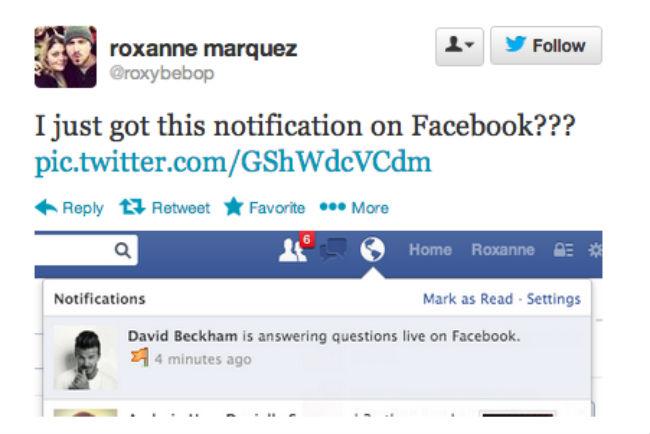
Facebook is testing a new feature that provides notifications when certain live events happen. And this feature represents another attempt to turn Facebook into a destination for real-time digital chatter — it’s another step towards the Twitterfication of Facebook.
BuzzFeed reports that Facebook sent a notification to users who followed David Beckham notifying them of a live question-and-answer session on the website, and a Facebook user named Roxanna Marquez pointed it out by capturing a screenshot of her event notification (interestingly enough, she posted it on Twitter).
Facebook responded saying the notification is part of an ongoing project “testing various notification types to help people discover content that might be relevant to them.”
The social network noted that only users who “liked” Beckham received the notification. If you’re a fan of a celebrity with an active Facebook presence, you may see a similar notification in coming weeks for events with celebrities, as Facebook tries to carve out its place as a digital space for live events and the accompanying digital chatter.
These new real-time event notifications are an attempt on Facebook’s part to encourage users to participate in conversations about stuff that’s happening at the moment. And the Beckham session scored a decent turnout for this first experiment. Whether or not they showed up because of the notification or because they found out another way, over 4,000 people participated in the question-and-answer comments, and over 18,000 “liked” the post.
That’s a strong showing for an event like this — but it doesn’t mean that these notifications will consistently lure social media users onto Facebook during big events. People were happy with it:
David Beckham is the rare celebrity with an active Facebook page but without a Twitter account, so Facebook events like this are rare chances for fans to post questions directly to the star soccer player/ridiculously handsome man, which may have increased enthusiasm here. If Beckham had a Twitter account and regularly interacted with fans, this event still might have drawn the same crowd, but it’s very likely the bulk of Beckham’s day-to-day fan interaction would take place on Twitter. For famous people that have both Twitter accounts and Facebook pages, like Miley Cyrus or the Kardashians, most of their digital interactions fans still happen on Twitter.
Facebook has been making efforts to woo celebrities, so if it can convince more famous people to eschew Twitter in favor of Facebook like Beckham has, it could boost its power as a place people come to try to casually communicate with celebrities online. But for now, despite this experiment, Twitter is still the best place to do that, and it will remain so unless Facebook situates back-and-forth public interactions in a better place on the site.
When you tweet at someone, it goes into their feed, but it doesn’t stick to their public profile in the same way a Facebook wall post does. Wall posts feel more formal, less conversational, and more like a message. Responding to a post someone made on your Facebook wall feels like replying to a message, while tweeting back at someone feels more rapid-fire and casual, like you’re talking, not writing. Twitter’s format favors real-time dialogue and Facebook’s does not, and no matter how many event notifications Facebook pushes at us or how many times they try to make hashtags happen, unless a formatting change that makes the site more suited to real-time talk happens, Twitter will still dominate that arena.
Editors' Recommendations
- Edited tweets may be coming to your Twitter timeline soon
- Facebook now lets businesses charge for online events
- Facebook’s Twitter account taken over by hacker group OurMine
- China is running Hong Kong disinformation campaigns through Facebook and Twitter


